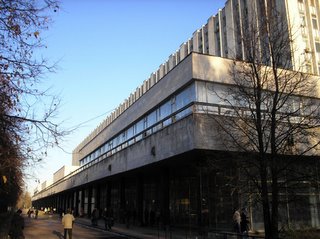Rotaract Moscow International is now Official
On what was Thanksgiving weekend in the U.S., I had the honor of becoming one of 20 Charter Members of Rotaract Moscow International. My host club in Russia, Rotary Club Moscow International, sponsored the creation of this Rotaract Club, which includes students and young professionals originally from Russia and several other countries including Bulgaria, Colombia, and with me, the United States. The language of the club is English. The Rotary District Governor (who is from Sweden, as this District is a joint Swedish-Russian District) attended to make the club official and presented each of the newly inducted members with Rotaract pins. Also in attendance to help celebrate the occasion were fellow Rotaracters from other clubs in Russia, Germany, Austria, Switzerland, and Italy, as well as Rotary exchange students from Canada and Taiwan, who are currently living in Siberia. Our guests had the opportunity to see some of the attractions of Moscow as well as visting our club’s service project, an orphanage for deaf & blind children in the town of Sergeev Posad, which is about 60km from Moscow.
I am quite new to the club, and so have not yet done much service, as all of the work in creating the club and determining its first project was completed before I started participating in October. I’m very pleased to be part of such an energetic and enthusiastic club, and hope to contribute much while I am here. It has also provided a way to get acquainted with like-minded people of my own age, many from Russia, and helps me integrate into life here. For example, at the social evening on Friday, in which we welcomed our fellow Rotaracters from other clubs, someone was asking the Canadian girl if Americans and Canadians make jokes about each other. The Canadian hesitated, since I was at the table, but a Russian girl from my club said, “Oh don’t worry about Steve as he is Russian for this year.” Another case concerns two Bulgarian guys who are in my club. We have commiserated over the difficulties of learning Russian, as although Bulgarian is a Slavic language, they found many aspects of Russian quite difficult before they achieved fluency, such as the case declensions (which Bulgarian doesn’t have), and they have been encouraging me in my struggle. When they discovered that I knew a little of the Macedonian language (which many consider to be a dialect of Bulgarian), they were very pleased, and were happy to hear me speaking a language so close to their own. They then taught me a Macedonian dance that we performed for the gathering (representatives of each country were doing some skit or performance indicative of their culture), making me sort of an honorary Bulgarian for the evening.


